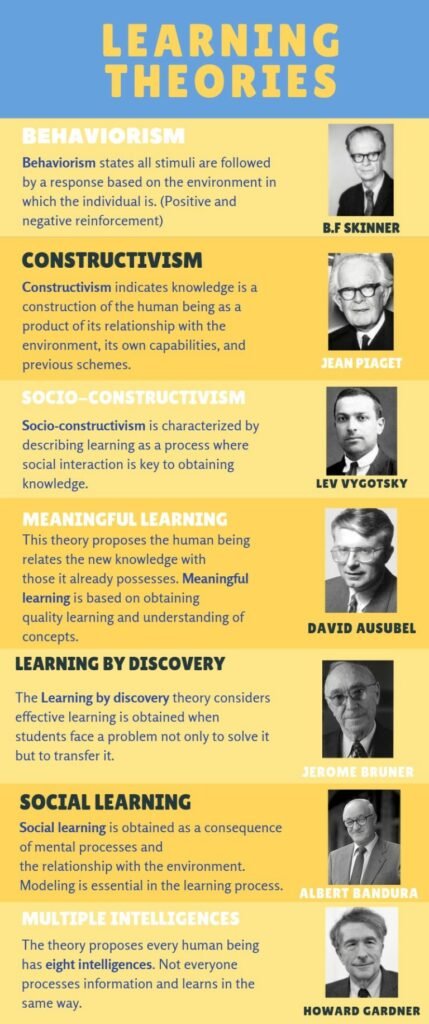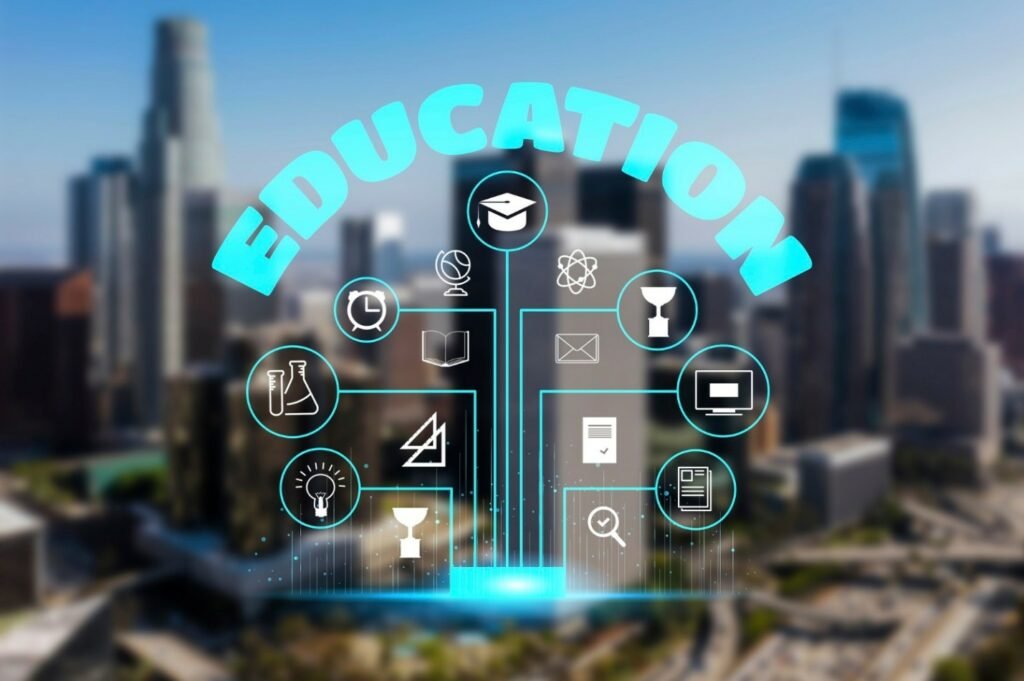“Students are not to pursue institutes; they are to pursue understanding.”
An educational psychology definition clarifies that it is a crucial aspect of the educational curriculum for prospective psychologists, teachers, and psychotherapists as it entails the examination of how individuals learn and develop within educational environments. Through this discipline, you can improve your knowledge base.
Understand how people learn and develop
Educational psychology theories include:
- Behaviorism – examines the principles of learning behavior through operant conditioning and reinforcement;
- Cognitivism – looks at how mental processes such as memory, problem solving, decision making, and metacognition affect learning;
- Constructivism – looks at how students construct knowledge based on their previous experiences and perceptions of the world around them;
- Socioculturalism – examines how social interactions and culture affect learning.

Infographic on Educational psychology theories
Using these theories along with research methods such as interviews, surveys, experiments, and observations, by definition, educational psychologist can gain a deeper understanding of learning and its outcomes. This information can be used to create effective instructional strategies that promote student success in a variety of educational contexts. It can be used to identify potential areas for improvement.
Identify and address learning difficulties
Educational psychology helps to understand the process of learning, development, and interaction between students. By applying these theories to real-world classroom situations, educational psychologists can identify any major problems that may be causing learning difficulties. It is also about identifying individual differences among students that may affect their ability to learn new information effectively and providing strategies that can help them overcome these difficulties. Additionally, utilizing a paper writing service for assignments can be a beneficial strategy for students who struggle with written expression, allowing them to focus on the content of their work without being hindered by language barriers or writing challenges.
Once the educational psychologist identifies any potential difficulties, he or she can work with teachers to develop appropriate strategies to help them succeed academically. Individualized learning plans for students who are falling behind are developed. Educational psychologists also play an important role in evaluating the effectiveness of curricula and providing feedback on how they can be improved.
Create effective instructional strategies
Professionals in this field typically use a range of assessment tools and techniques to understand the needs, abilities, and interests of individual students. They then use this information to develop instruction that best meets those needs.
Educational psychology includes a number of theories that focus on understanding how people learn, such as:
- constructivism;
- behaviorism;
- cognitive-developmental theory;
- social learning theory;
- humanistic approaches.
These theories provide guidance to teachers on how to create effective learning strategies. For example, constructivist theory argues that students should be actively engaged in their own learning process through meaningful activities. This means developing assignments that allow students to explore concepts independently or make connections between different topics. Educators can also apply social learning theory by creating collaborative activities for students to learn from each other’s experiences.
Promote positive outcomes
Educational psychology is a field that focuses on understanding learning and improving outcomes. Various factors are considered, such as:
- motivation;
- ability;
- personality;
- self-regulation;
- social interaction;
- cognitive development;
- methods that can influence learning.
Assess student learning
It covers a wide range of topics such as:
- learning theories;
- motivation;
- assessment;
- classroom management;
- curriculum design and development;
- instructional design;
- problem solving;
- decision making.
Educational psychologists use evidence-based approaches to identify students’ academic needs and develop strategies to help them succeed academically.
Student assessment is one way educators measure their effectiveness. Through this process, they can observe changes in student performance over time and determine which strategies are effective or ineffective. The assessment also helps guide instructional decision-making by providing feedback. This can lead to improvements in teaching methods and student learning outcomes overall.

Improve education systems
This covers research on issues such as:
- student motivation;
- classroom management;
- assessment methods;
- learning strategies.
The theories of educational psychology are based on both scientific methods and practical experience, with an emphasis on understanding individual differences in learning styles, abilities, and achievement.
The primary goal of educational psychologists is to provide effective education that meets individual student needs. They use their knowledge of learning theory and assessment methods to develop strategies to improve learning and student outcomes. They also work with teachers to create curricula that meet students’ needs. They provide guidance on how to create a positive learning environment that promotes critical thinking skills and encourages active participation in the course material.
Promote social and emotional development
This is an aid to:
- learn how to interact effectively with others;
- manage emotions;
- build relationships;
- resolve conflicts;
- practice empathy;
- develop problem-solving skills;
- become responsible citizens;
- understand the importance of ethical behavior.
These practices provide insight into how students interact with each other and with the world around them.
In addition to facilitating social and emotional development, educational psychologists also support student success by assessing student needs, developing effective strategies, evaluating curriculum content, and addressing potential barriers to learning, such as anxiety or dyslexia. Educational psychologists strive to help children reach their full potential by providing effective support systems in the school environment.
Support students’ mental health
These include:
- Cognitive development theory – examines the ways in which people develop thinking skills over time;
- Information processing theory – examines how people perceive, store, and recall information;
- Social constructivism theory – looks at how people learn through social interaction with others.
By understanding these theories, educational psychologists can assess the needs of individual students and provide support to help them succeed in school. They can offer interventions such as cognitive behavioral therapy or relaxation techniques to help manage their emotions and stress levels. They also provide guidance on effective learning strategies and support for parents. The goal of educational psychology is to create an environment that promotes the success of all students while promoting healthy mental well-being.

